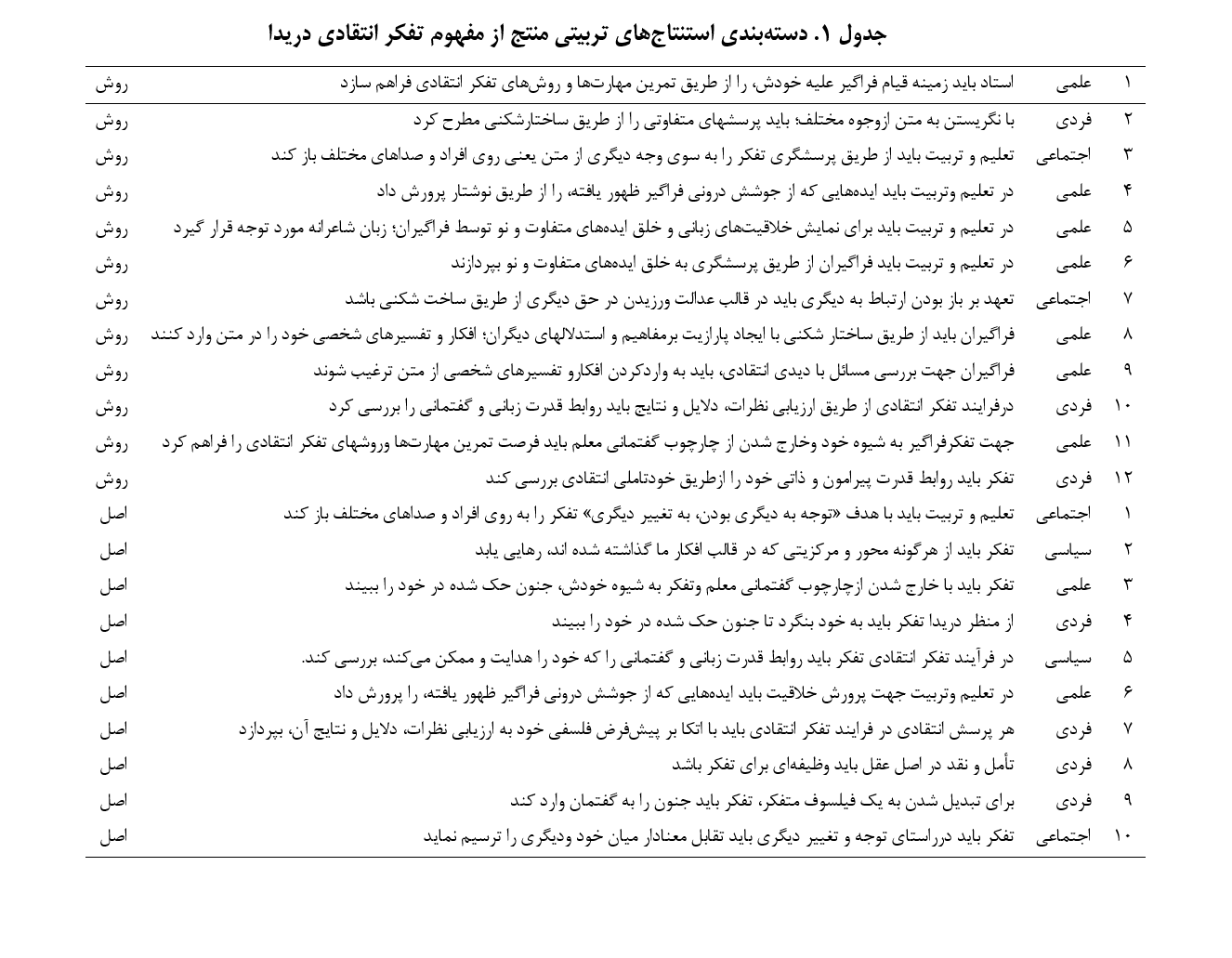Educational Implications Derived from Derrida's Concept of Critical Thinking
Keywords:
Critical Thinking, Derrida, Postmodernism, EducationAbstract
The present study aims to infer the educational implications derived from Jacques Derrida's concept of critical thinking. To achieve this, an analytical-inferential method has been employed. Critical thinking from Derrida's perspective is a complex and multifaceted concept. In his view, critical thinking is related to the analysis and critique of language, texts, concepts, ideologies, and power structures. Derrida believes that no fixed or absolute meaning exists, and all meanings are formed in a play of signs and differences. Critical thinking, according to Derrida, means questioning any established truth, value, reasoning, or principle. Instead, he examines and critiques the methods, criteria, assumptions, and consequences. Derrida emphasizes that education should be critical in nature; he believes that critical thinking should be central, asserting that all aspects of education should be subject to change. In schools, alongside teaching critical thinking, emphasis should be placed on cultivating critical learners. In this way, the process of teaching and learning will be established in a critical and investigative manner. In this regard, the present study, through the exploration of Derrida's concept of critical thinking, aims to infer the educational implications stemming from his views using Frankena’s model.
Downloads
References
Snir I. Education and Thinking in Continental Philosophy, Contemporary, Philosophies and Theories in Education 17:
Springer Nature Switzerland AG; 2020.
Alavi SH, Salehi Kermani A. Teaching Critical Thinking: From Theory to Practice. Quarterly Journal of Cultural
Researchers. 2012;11(31):175-52.
Myers C. Teaching Critical Thinking. Tehran: SAMT; 1995.
Ebrahimkhani M, Ajam M. Critique and Analysis of the Epistemological Components of Postmodernism and Its
Educational Implications in Education. Journal of Modern Advances in Psychology, Educational Sciences, and Education.
;5(51):30-42.
Ebrahim E. An Analysis of Derrida's Educational Thoughts and Its Critique. Journal of New Educational Approaches.
;5(1):149-70.
Niyami M, Mirghiyasi SA, editors. Exploring the Nature of Critical Thinking Education from the Perspective of Islam
and Postmodernism. First National Conference on Humanities and Islamic Wisdom; 2021; Tehran.
Shamboul H. The Importance of Critical Thinking On Teaching Learning Process. Journal of Social Sciences.
;10(3):29-35.
Kiani M, Sadeghzadeh Ghamsari A. Explanation of Dominant Methodological Approaches in Research on the
Philosophy of Education in Iran and Methodological Analysis of PhD Dissertations. Journal of Foundations of Education.
;1(2):119-32.
Bagheri K. Approaches and Research Methods in the Philosophy of Education. Tehran: Institute of Cultural and Social
Studies; 2010.
Bojesen E. Contradictions in Educational Thought and Practice: Derrida, Philosophy, and Education. Studies in
Philosophy and Education. 2021.
Derrida J. Mochlos, or the conflict of the faculties. Palo Alto: Stanford University Press; 2004. 83-112 p.
Derrida J. The principle of reason: The University in the eyes of its pupils. Palo Alto: Stanford University Press; 2004.
-55 p.

Downloads
Published
Submitted
Revised
Accepted
Issue
Section
License
Copyright (c) 2024 Journal of Study and Innovation in Education and Development

This work is licensed under a Creative Commons Attribution-NonCommercial 4.0 International License.










